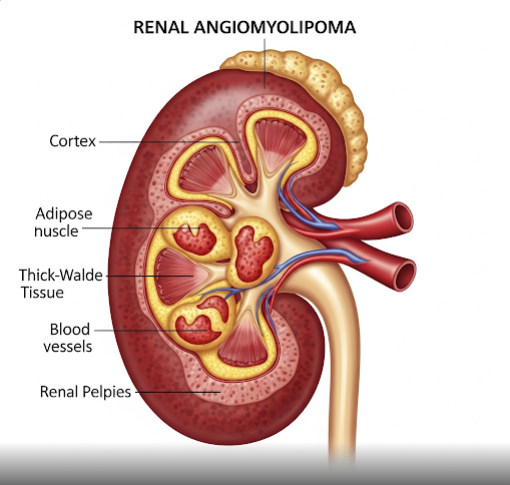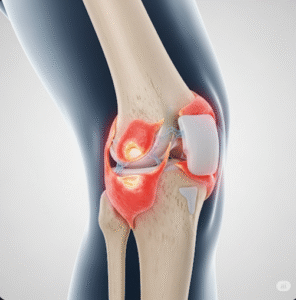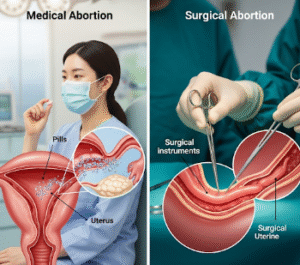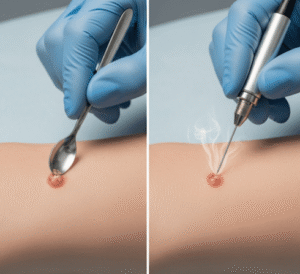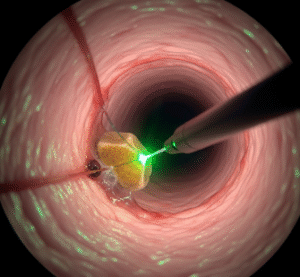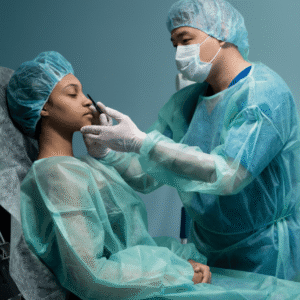Overview
Renal angiomyolipoma (AML) is a benign (non-cancerous) tumor of the kidney composed of blood vessels (angio-), smooth muscle (-myo-), and fat tissue (-lipoma). Though benign, these tumors can grow large and cause symptoms such as pain or bleeding. In Korea, diagnosis and treatment of renal angiomyolipoma benefit from advanced imaging technology and expert urological care.
What is Renal Angiomyolipoma?
A renal angiomyolipoma is a mixed tissue tumor arising from the kidney. It consists of an abnormal mixture of blood vessels, smooth muscle cells, and fat. Most AMLs are sporadic and solitary but can also be associated with genetic conditions like tuberous sclerosis complex (TSC).
Symptoms
- Often asymptomatic and discovered incidentally on imaging
- Flank pain or abdominal discomfort when tumors enlarge
- Hematuria (blood in urine) if bleeding occurs within the tumor
- Palpable mass in large tumors
- Rarely, spontaneous rupture causing life-threatening bleeding (Wunderlich syndrome)
Causes
- Sporadic cases occur without known cause
- Associated with tuberous sclerosis complex (TSC), a genetic disorder causing multiple AMLs and other tumors
Risk Factors
- Female gender (AMLs are more common in women)
- Tuberous sclerosis complex
- Larger tumor size (>4 cm increases risk of complications)
Complications
- Spontaneous hemorrhage due to fragile tumor blood vessels
- Compression of surrounding kidney tissue causing functional impairment
- Rare malignant transformation is extremely uncommon
Prevention
- No specific prevention, but regular monitoring is important for known AMLs, especially larger ones or those associated with TSC
Treatment Options in Korea
Diagnosis
- Ultrasound, CT scan, and MRI are commonly used to identify and characterize AMLs
- Imaging helps differentiate AML from malignant kidney tumors based on fat content
- Genetic testing if TSC is suspected
Medical Treatments
- Active surveillance for small, asymptomatic AMLs (<4 cm) with periodic imaging
- mTOR inhibitors (like everolimus) used in TSC-related AML to reduce tumor size
Interventional & Surgical Treatments
- Selective arterial embolization to block blood supply and reduce bleeding risk
- Partial nephrectomy or tumor enucleation to remove large or symptomatic AMLs while preserving kidney function
- Radical nephrectomy in rare cases with large or complicated tumors
Advanced Therapies
- Minimally invasive laparoscopic or robotic-assisted surgery is widely available in Korea
- Use of cutting-edge imaging and intraoperative navigation for precision surgery
Rehabilitation and Support
- Post-treatment monitoring of kidney function and tumor recurrence
- Supportive care for symptoms and management of TSC if applicable
Top Hospitals or Clinics in Korea for Renal Angiomyolipoma
- Seoul National University Hospital – Renowned for urology and advanced minimally invasive surgery
- Asan Medical Center – Leading center for kidney tumor management and interventional radiology
- Samsung Medical Center – Specialized in robotic and laparoscopic kidney surgeries
- Yonsei Severance Hospital – Offers comprehensive care for kidney tumors and genetic disorders
- Korea University Anam Hospital – Known for advanced imaging and urological expertise

